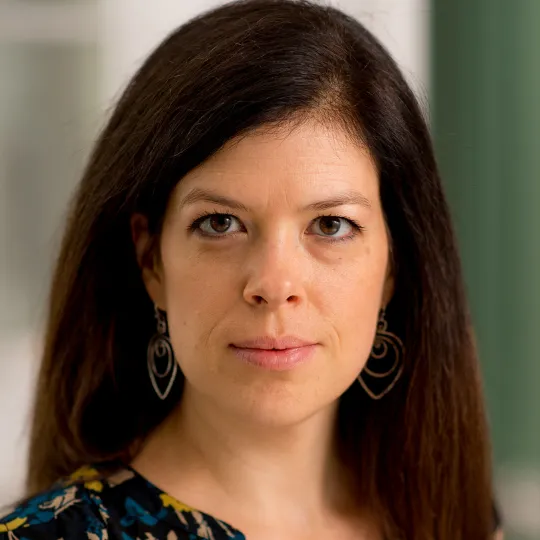
Dr Katrin Schreiter
Senior Lecturer in German and History
Research interests
- History
Pronouns
she/her
Biography
Katrin Schreiter is Senior Lecturer in German and History and a joint appointment in the Departments of Languages, Literatures & Cultures and History. She studied History, Political Science, and North American Studies at the Freie Universität Berlin, where she was awarded a postgraduate fellowship for the United States. During her tenure at the Ohio State University, Katrin completed an MA in Diplomatic History in 2005. She then went on to earn a PhD in Modern European History at the University of Pennsylvania in 2012. Before joining King’s College London in 2013, she taught twentieth-century history at the University of Pennsylvania and in the Department of European Cultural History at the Universität Augsburg. Katrin is a Fellow at the Center for Sports and Business, Stockholm School of Economics, and a visiting scholar at the Department of Management at Università Ca' Foscari Venice in the spring of 2024.
Research interests and PhD supervision
- 20th-century European history
- Cold War
- Cultural approaches to economic and business history
- Consumption and everyday life
- Material culture studies
Katrin Schreiter’s main research lies in the field of 20th-century German history. One area of focus has been the interplay of economics and culture during the Cold War, and how these arenas are connected to the politics of German and European diplomacy through negotiations over the German-German relationship. She employs material culture methodology as an anchor for identity discourses on national, regional, and individual levels. Related publications have included analysis of the two German states’ nation branding efforts as well as an examination of East German firm identity under the institutional pressures of communism.
Currently, Katrin is working on a new project that expands her scope of inquiry from Germany to Britain, Italy, and France at the turn of the 19th century. It will address port cities as zones of encounter between European populations and colonial products in the context of national imperial discourses. The comparison between major colonial ports of early and late colonial empires aims to shed light on the role of transnational links for socio-cultural development and formation of class identity in these four countries.
Katrin welcomes applications for PhD topics related to any of her research interests.
Teaching
Katrin Schreiter has taught modules ranging from international history to modern European history with a focus on Germany. Her modules cover global topics such as the Cold War or industrialization, building on her expertise in cultural and business history. In her teaching, she offers different theoretical approaches and historical methods, including class, gender, race, visual and material culture, to allow students to critically engage with historical evidence and to gain a better understanding of the past and its influence on the present.
Expertise and Public Engagement
In collaboration with the German Historical Institute London, Katrin Schreiter developed a prize-winning public engagement project on the topic of migrants’ material traces in 2015. “Things We Keep: Curators of Our Own History” used material culture and oral history methodologies to curate an exhibition and create an online archive: www.thingswekeep.org. Katrin has given numerous media interviews including BBC World Service, RBB Kulturradio and the Deutsche Presse Agentur. She welcomes media requests about postwar German history and current political culture. Katrin has featured in several podcasts and videos about the German past:
- Video: The Telephone Exchange Phrasebook, Glimpses of German History series, German History Society, 2023.
- Podcast: The Berlin Wall, Conflict of Interest series, Imperial War Museum, London, 2022.
Selected publications
- K. Schreiter, Designing one nation: The politics of economic culture and trade in divided Germany. New York: Oxford University Press, 2020.
- E. Carter, J. Palmowski, and K. Schreiter, eds. German division as shared experience: Interdisciplinary perspectives on the postwar everyday. New York/London: Berghahn Books, 2019.
- K. Schreiter and D. Ravasi. "Institutional pressures and organizational identity: The case of Deutsche Werkstätten Hellerau in the GDR and beyond, 1945-1996." Business History Review 92, 3/2018, 453-481.
- K. Schreiter, "Revisiting Morale under the Bombs: The Gender of Affect in Darmstadt, 1942-1945." Central European History 50, Issue 3/2017, pp. 347-374. DOI: 10.1017/S0008938917000632.
- P. Aversa, K. Schreiter, and F. Guerrini. “The birth of a business icon through cultural branding: Ferrari and the Prancing Horse, 1923–1947.” Enterprise & Society 24, Issue 1/2023, pp. 28–58. DOI: 10.1017/eso.2021.22.
Research

Centre for German Transnational Relations
The centre examines Germany's changing transnational role in the economic, political and cultural spheres. We study how the recent rise of Germany to a position as a 'reluctant hegemon' shapes European economies as well as the world economy.
News
King's launches new Modern World History MA
A new Master’s degree by the Department of History is now open for applications.

COMMENT: Why Germany's far right hates the Bauhaus movement
At a time of political tension in Germany, the Bauhaus – arguably one of most influential architecture, art and design schools in the world – has become the...

COMMENT: Thirty-five years since the wall fell, Berlin is divided – over what to do with crumbling communist buildings
The 35th anniversary of the fall of the Berlin wall, an event that powerfully symbolised the collapse of communism in eastern Europe and signalled the end of...

New design exhibition features work of academic
The research of a King’s academic formed a central part of a new exhibition at a museum in Germany.

How Cold War thaw began long before fall of Berlin Wall
East and West Germany were moving closer together in search of shared economic progress and identity even before the fall of the Berlin Wall, a new book has...

King's Historians feature in new podcast
King’s Historians have been contributing to a new podcast for History Hit TV, the online history channel with Dan Snow.
#ThingsWeKeep - German expats needed
A new modern archaeology project, 'Things We Keep – curators of our own history', is curating objects that German expats have brought from home

Research

Centre for German Transnational Relations
The centre examines Germany's changing transnational role in the economic, political and cultural spheres. We study how the recent rise of Germany to a position as a 'reluctant hegemon' shapes European economies as well as the world economy.
News
King's launches new Modern World History MA
A new Master’s degree by the Department of History is now open for applications.

COMMENT: Why Germany's far right hates the Bauhaus movement
At a time of political tension in Germany, the Bauhaus – arguably one of most influential architecture, art and design schools in the world – has become the...

COMMENT: Thirty-five years since the wall fell, Berlin is divided – over what to do with crumbling communist buildings
The 35th anniversary of the fall of the Berlin wall, an event that powerfully symbolised the collapse of communism in eastern Europe and signalled the end of...

New design exhibition features work of academic
The research of a King’s academic formed a central part of a new exhibition at a museum in Germany.

How Cold War thaw began long before fall of Berlin Wall
East and West Germany were moving closer together in search of shared economic progress and identity even before the fall of the Berlin Wall, a new book has...

King's Historians feature in new podcast
King’s Historians have been contributing to a new podcast for History Hit TV, the online history channel with Dan Snow.
#ThingsWeKeep - German expats needed
A new modern archaeology project, 'Things We Keep – curators of our own history', is curating objects that German expats have brought from home

